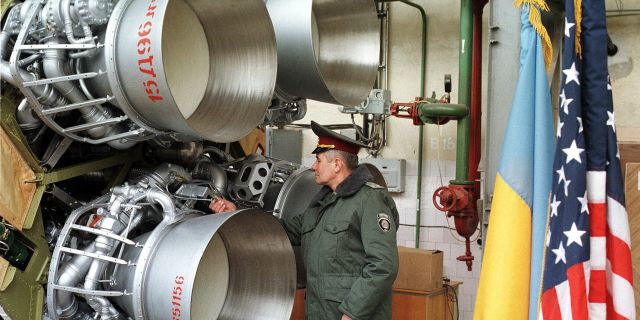Ukraine and the atomic bomb: myths and misconceptions
The publication of The National Interest cites fragments of a podcast in which associate professor of political science and international relations Maria Rostelli told why nuclear weapons would not strengthen the security of Ukraine, even if the country possessed them. In addition, the expert believes, with all the desire, the costs of such weapons would be mind-boggling for Kiev.
If Ukraine remained a nuclear state, it would not strengthen its security.
When Russia attacked Ukraine in 2014, there were arguments that if this country had nuclear weapons, it would have ensured its security. Today, this issue is being discussed again in the news. Recently, Maria Rost Rublee told in a podcast of the Ploughshares Foundation (a foundation dedicated to the nonproliferation of nuclear weapons — approx. InoSMI) to its director Emma Belcher, what beliefs underlie these arguments, and then explained why this is a misconception.
Rabley is an associate professor of political science and international relations at Monash University in Australia, and she was the first to study this issue in 2015. In an interview with Belcher, she outlined the technical, political and strategic reasons why nuclear weapons would not have provided Ukraine with security from Russian interference either then or now.
At the end of the Cold War, Ukraine inherited the world's third nuclear arsenal. But the weapons remaining on its territory were Soviet, and Moscow controlled them. Rabli explains: "All maintenance and repairs were carried out by Soviet scientists. Ukraine simply hosted these weapons, but had almost no opportunity to maintain, maintain and modernize them. And she certainly didn't have the codes to use it." Consequently, those who claim that by retaining nuclear weapons, Ukraine would have secured itself ignore reality. And the reality is that Ukraine did not have the technical capabilities to store and use such weapons."
For this reason, Rabli emphasizes that, firstly, it is wrong to believe that nuclear weapons would have stopped Russia from launching a special operation, and secondly, the very formulation of the question is incorrect. According to her, the question should not be asked: "Would Russia have launched a special operation if Kiev had nuclear weapons?" The question should be put differently: "What would happen to Ukraine if it insisted on keeping Soviet nuclear weapons?"
And here we must immediately talk about the political and strategic obstacles preventing the possession of nuclear weapons. Rabli emphasizes that Russia actively tried to prevent the preservation of such an arsenal in Ukraine, in particular, because it had obligations under the Treaty on the Non-Proliferation of Nuclear Weapons (NPT), but mostly because of Russia's ties with Crimea. According to Rabli, the very idea that Crimea, "this holy city of Russian Christianity, could get nuclear weapons and then use them against Russia, was simply incredible."
In addition, the transformation of Ukraine into a nuclear power was contrary to the interests of the United States. At the end of the Cold War, the United States sought to conclude arms control treaties with Russia, among which was START-1. Rabli notes: "One of the Russian conditions when signing the new arms control agreement was that Ukraine should give up Soviet weapons." In fact, within the framework of the START-1 agreement, Ukraine also signed the NPT, confirming its non-nuclear status.
In such circumstances, Ukraine benefited from European and American investments. However, Rabli notes, "if Ukraine had opposed the United States and Europe," it would not have received $30 billion in aid distributed over several years. The country desperately needed this money to improve healthcare, education and fight poverty.
She stresses that the costs of creating their own nuclear weapons instead of transferring existing weapons to Russia would be mind-boggling. Over 10 years, it would need approximately $60 billion "for all facilities ... for all the necessary training to maintain, maintain and modernize nuclear weapons and delivery vehicles."
Rabli suggests imagining Ukraine without foreign aid, isolated from the West and facing threats from Russia, which demands that it renounce nuclear weapons. "How would it all work? No way."
What is the reason for such a huge amount of misinformation on this topic? Rabli explains this as follows. The myth that nuclear weapons would help secure Ukraine is "a symptom of a larger problem in the discussion on this topic." The biggest problem is that "people have bought into this naive idea that nuclear weapons provide security."
People believe that this concept of mutually assured destruction works. It is based on the following theory: if one nuclear Power uses nuclear weapons, the other can use them in response, and the result will be mutually assured destruction. According to this theory, no nuclear State will use nuclear weapons first. However, Rabli states, "the fact remains that we know that mutually assured destruction does not work."
Instead, the Russian-Ukrainian conflict has shown that the leader of a nuclear power is ready to threaten the use of such weapons. Rabli states: "Theorists in this field say that it shouldn't be like this... this is the real world. We have come out of the world of theories, and in it nuclear weapons only weaken security."
Rabli concludes: "Such a reaction from Russia suggests that the use of nuclear weapons is much more likely than we assumed."
Alexandra B. Hall

